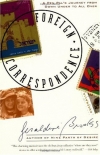Foreign Correspondence: A Pen Pal's Journey by Geraldine Brooks (finding audrey .TXT) 📗

- Author: Geraldine Brooks
Book online «Foreign Correspondence: A Pen Pal's Journey by Geraldine Brooks (finding audrey .TXT) 📗». Author Geraldine Brooks
Joannie last saw Dolfi just after her graduation, when she was well enough to take a trip to Europe. The reunion was warm, and may have helped her as she gathered herself together to apply for graduate school. Once, she had written to Dolfi’s mother about her pleasure in tending plants, and his mother had written back, saying, “Someday you will tend people.” In the study of social work, Joannie at last seemed to have found a way to subsume her own problems by looking for solutions to the problems of others. She also had an excellent new therapist and was eating much more normally. “She seemed at last to be winning the battle,” Elizabeth says. But Elizabeth also knew the dangers of too much optimism. Joannie had been active in the Anorexia Aid Society, writing for its journal. “She wrote a couple of articles that said she’d recovered,” says Elizabeth. “I’d cross my fingers because I could see it was not secure.”
Joannie moved into the apartment in New Brunswick and called her mother to ask advice about how to defrost the refrigerator. The next day she called again. She had misplaced the phone number of her therapist. “She said she needed to talk to her because she was anxious about a statistics course.” As Elizabeth put down the phone, the familiar fears for her daughter returned. Joannie was still rail-thin, and Elizabeth knew very well how easily an anxiety attack could trigger a dangerous eating episode.
The next day Joannie was found dead. The autopsy couldn’t say whether the direct cause was heart arrhythmia brought on by an electrolyte imbalance, or aspiration of vomit. The years of near starvation had taken a terrible toll on all of her organs, and that last binge was one insult more than her frail body could bear.
• • •
“We are still trying to recover our balance,” Elizabeth had written to me back in 1982 when she broke the news of Joannie’s death. Fifteen years later, she still is trying.
Joannie never wrote to tell me that she had become a Catholic in her final years, adopting the religion I’d cast aside. Hers was the Catholicism of the liberation theologians and the social-activist Maryknolls, very different from the rigid, conservative Church I’d known. Elizabeth had been drawn to the caring nuns and priests who had tried to help Joannie. After Joannie died, Elizabeth too had converted. And in the taking of the Eucharist she found a connection with her daughter.
But the questions have never stopped. Even after all the therapists and discussion groups and social workers, there remains no answer to the question of why Joannie became ill, or why, after she came so close, recovery in the end eluded her.
A relative of Joannie’s who is a psychiatric pharmacologist at Yale believes Joannie suffered an imbalance in her brain chemistry during the multiple hormonal changes of adolescence.
But Elizabeth is sure that “something much deeper than chemicals” was involved. She asks if I know the story of “The Snow Queen” by Hans Christian Andersen. When the Snow Queen tosses a piece of ice, it lodges in a little boy’s heart and freezes it. He can no longer feel love. In the fairy tale, a little girl named Gerda searches the world for the boy and, when she finds him, her love melts the ice.
“Joannie’s heart was frozen,” Elizabeth says. “She was always trying desperately to warm it. But for Joannie no love was warm enough.”
Alongside the tall stack of letters from my fifteen-year correspondence with Joannie there is a smaller, still growing pile that bears a similar handwriting. There are postcards from Menemsha, and letter-cards sold for the benefit of UNICEF or Catholic Relief Services or the League of Women Voters.
Elizabeth and I write to each other now. Her latest card has a pen-and-ink sketch of a Martha’s Vineyard townscape. “We had a brief thunderstorm a couple of days after you left, when the sky was spectacular—it seemed feathered with the soft gray breasts of countless doves.”
Elizabeth’s letters are a link with that other, long-ago correspondence. But they have become much more than that. “I suspect you realize how much your visits mean,” she writes in her latest letter, “because of course in my mind I’ve adopted you. How could it be otherwise?”
And in my mind I’ve adopted her. How could it be otherwise?
She was going to be you.
Joannie wasn’t going to be me. But I’m grateful for the ways in which my life has allowed me to be her.
10
Arab, Jew and Aussie
contact book (purged?)
passport & visa
$ + local currency + Amex
notebooks & pens
shortwave + extension aerial + batteries
Pocket Flight Guide
sunglasses, sunscreen, hat
½ doz. passport photos
ref. books + notes + novel
maps
canteen + water-purify tabs?
dried food?
pocket knife?
antibiotics, field dressings, hypodermic
deodorant, moisturizer, lipbalm, Handiwipes, Evian, hairbrush, tampons, toothbrush & paste
underpants and bra
long skirt, 2 khaki pants & vest, 2 long-sleeve shirts, 2 T-shirts, sneakers
king suit, pumps & stockings
chador?
BP vest?
For eight years this twenty-point checklist sat in a drawer of my bedside table, ready for the late night calls: “Saddam’s gassed the Kurds.” “Khomeini’s finally kicked it.”
Everything on the list, except item 20—the bulletproof vest—could be crammed into a nylon duffel bag that just fit under an airplane seat. (The first rule of Foreign Correspondence: never check in any luggage. It’s unfortunate to arrive at an





Comments (0)